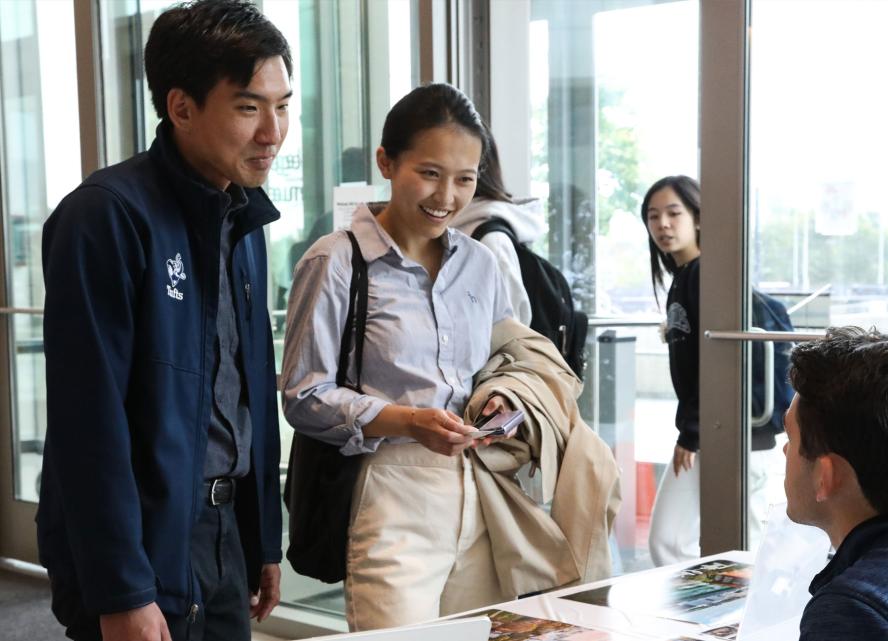
Breadcrumb
Amanda Wang and Jun Yoon: Breaking Language Barriers Through Tech-Enabled Education
How two MSIM graduates built a nonprofit that’s transforming English education access for immigrants.
Key Impact Facts
Community Member: Alumni
Program: MSIM ‘19
Industry: Education Technology
Impact: 343 learners served

The Challenge
Across the United States, more than 23 million adults face significant barriers to English language education, with research showing 95% cannot access the learning resources they need.
Current options fail to meet the requirements of immigrant communities. Publicly funded classes often have multi-year waiting lists and rigid scheduling requirements, while digital learning platforms lack the human interaction essential for building speaking confidence and cultural integration.
When Amanda Wang and Jun Yoon interviewed Mary Truong, Executive Director of the Massachusetts Office for Refugees and Immigrants, they uncovered the scale of this crisis. “At this point, there’s no estimated time of how long it takes to get off the waitlist, but it could take two years,” Amanda recalls, describing the 17,000 people waiting for state-sponsored English programs. “So, I thought this was a great starting point.”
The Applied Business Approach
Amanda Wang and Jun Yoon entered the MS in Innovation & Management program ready to create change. The program’s Innovation Sprints became the foundation for what would become Potencia, founded while they were still students in 2019.
“The Innovation Sprints gave us a space where we can learn from each other, complement each other, make something together,” Jun reflects. “I think that the possibility that the Sprint has given for people to unleash their potential, that’s the critical achievement of the Sprint project.”
The applied business mindset and skillset proved essential for building a sustainable nonprofit. Amanda notes that courses like marketing and finance are used every day, applying principles from those business courses to daily operations. The supportive MSIM community shaped their approach: “The people have really good hearts, as Kevin Oye once said ‘high brain, low ego’. This really helps us a lot in thinking about problems and putting ourselves in our customers’ shoes.”
The competitions throughout MSIM gave Amanda and Jun opportunities to test their ideas, hear feedback, and get coaching. Since graduating, they still apply to any competitions that apply because they are a good way for Potencia to advocate their service to people outside the immediate area.
The Solution in Action
Potencia empowers adult immigrants to gain economic mobility by democratizing access to personalized, low-cost English language education, powered by civic leadership and technology. The organization recruits and trains civic-minded community members, including college students and corporate employees, as volunteer English tutors.
Adult immigrants pay $5 per session to access personalized language tutoring at a time that works best for them. The Potencia App, described as an equivalent of “ClassPass for adult immigrants,” brings access to tutoring services to the fingertips of learners.
The programs are available online, are flexible and 10-weeks long, and are tailored to the needs of each learner. This tech-enabled approach removes the barriers of fixed schedules and geographic limitations that prevent many immigrants from accessing language education.
The Real-World Impact
By the Numbers:
- 371 Tutors Trained
- 343 Learners Served
- 2,384 Learning Hours
- 7 Chapters established
- 89% of learners who completed 10 tutoring sessions or more report improved confidence and proficiency in English
- 60% of learners advance in their careers and education after three packets
- 70% of learners have increased access to social services and community resources after a packet
The Human Side:
For Jun, the work connects to a deeper purpose: “There’s a term called transitional justice, which academically has been mostly adopted in the setting of when a nation or state changes from, for example, from a war-torn state to a more peaceful state. I think the transitional justice we can provide can be applied to migrants, people who are actually transitioning from one state of living to another state of being which could be totally new.”
Amanda sees language learning as more than skill acquisition: “One language is one unique culture, and when you are able to speak or learn another language, you’re not just building your language skills, but you’re also building your intercultural understanding and it opens up your mind. I realized that my personality can be a little bit different as I speak in different languages. So it’s also a good way to compare and reflect on myself.”
In 2024, Potencia partnered with the City of Boston and the City of Malden to provide flexible and personalized online English language tutoring to local residents, expanding their reach through official channels.
Looking Forward
Potencia continues to evolve its technology and expand its impact. Plans include further development of the Potencia App to streamline matching and track progress, launching new tools, and strengthening partnerships with municipalities and organizations.
As Co-Founder and CEO, Amanda Wang, and Co-Founder and COO, Jun Yoon, continue working to ensure that language learning empowers immigrants to achieve their full potential in their new communities.
Their journey exemplifies how applied business principles can drive social change. By combining the strategic thinking, operational skills, and entrepreneurial mindset developed at MSIM with a deep commitment to immigrant communities, Amanda and Jun have created a scalable solution to a challenge affecting millions.
Connection Points
Learn More: potenciainc.org
Program Information: MS in Innovation & Management